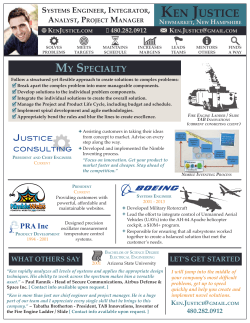
Loach - Architecture_MPS
Housing – Critical Futures. Statement by: Ken Loach Film Director. -Collectivity – a political solution to the affordable housing problem Poor housing and homelessness are a continuing disaster: those without a home include ninety three thousand children, nearly sixty thousand families with over a million and a half families on council waiting lists. We should not be surprised. In a market economy, it is not need that drives the building of homes but private profit. That system may work for the big building contractors but it certainly doesn’t work for the vast majority of people. Dwellings are now not seen primarily as homes for people but as investments. You can’t afford one? Too bad, join the queue for rented accommodation. Rents too high? Tough. Get out of London or squash in with friends or family. After the war we thought differently. Planners, architects and building contractors were employed directly by local authorities. There was a plan. Good homes, employment, schools, transport, hospitals and green spaces were seen as essential, not luxuries. Housing was a collective responsibility not a market opportunity for business to exploit. That is a humane and civilised way to build a society. We should return to it – and avoid the mistakes that were made later. The Thatcherite, New Labour approach of breaking up established communities has been a predictable disaster, based as it was on the perception that greed was good and that avarice was the motor that would drive us to a more prosperous future. What liars and scoundrels those politicians were! A change is needed. Architecture_MPS. April 2015. Housing – Critical Futures. Statement Series. Ken Loach. http://www.sixteenfilms.co.uk/ But when we think about building affordable homes there is another issue we should think about. It is not only a question of housing numbers, house prices, breaking or making communities, healthier habitation and more, there are also questions to be asked with regard those employed in building these homes. The rights of workers in a construction industry led by profit are key concerns. The conditions for building workers have deteriorated greatly over recent decades; people are blacklisted with police connivance for Trade Union activity and never work again; workers are exploited by endless sub-contracting pushing down wages and increasing job insecurity; and, in addition, construction sites continue to be dangerous places to work on. Furthermore, there are many building workers among the unemployed. Young people could train with proper apprenticeships and could help build the homes of the future. When we think about affordable housing we should not do it in isolation. Affordability can’t be allowed to result in more profit, lower wages and poorer working conditions. It is a question of justice and rights on multiple levels. Let’s get back to a planned economy, directly employed labour and collectively solve these complex and integrated problems. We know we can do it and we have done it before – all we need is the political leadership to carry it through. Ken Loach March, 2015. Amongst Ken Loach’s most influential films was Cathy Come Home, 1966. The film led to a campaign on the issue of housing provision in the UK led William Shearman and Ian Macleod and the subsequent establishment of the homeless charity, Crisis in 1967. Ken Loach remains committed to the issue. Architecture_MPS. April 2015. Housing – Critical Futures. Statement Series. Ken Loach. http://www.sixteenfilms.co.uk/
© Copyright 2025















